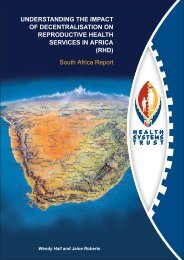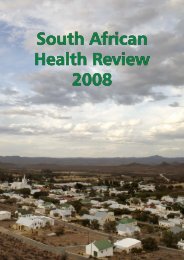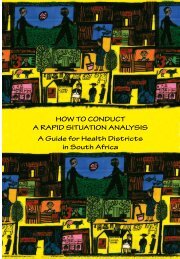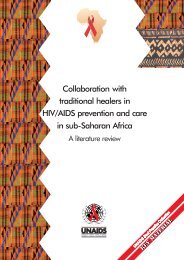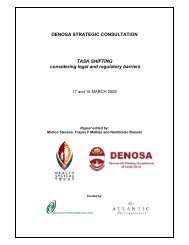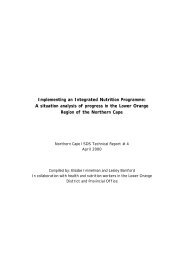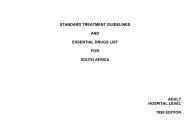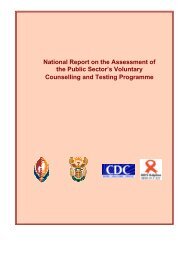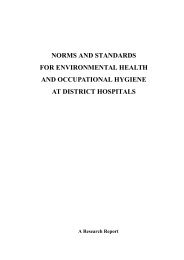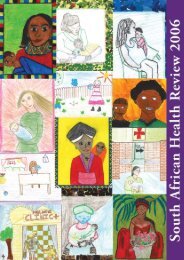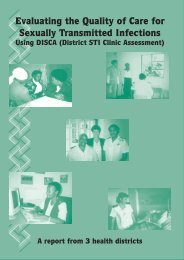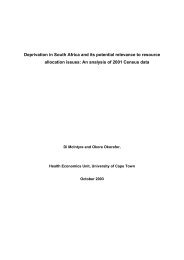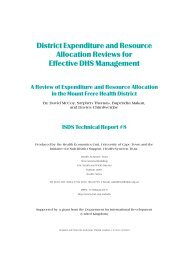SAHR 2007 - Health Systems Trust
SAHR 2007 - Health Systems Trust
SAHR 2007 - Health Systems Trust
You also want an ePaper? Increase the reach of your titles
YUMPU automatically turns print PDFs into web optimized ePapers that Google loves.
Traditional and Complementary Medicine 12<br />
was taken to gather data on the state of implementation of<br />
TM for a ‘mid-term’ review to be held in 2008. The commitments<br />
made by South Africa to TM in this forum have not<br />
penetrated the health sector and are virtually unknown in<br />
the private sector.<br />
It was recommended that the African Union Ministers of<br />
<strong>Health</strong> adopt the OAU Pharmacopoeia on Medicinal Plants,<br />
which could serve as a basis for each Member State to<br />
develop their own first volumes of pharmacopoeia on TM.<br />
The adoption of the OAU would facilitate and allow tangible<br />
cultivation, production and registration of medicinal plants<br />
that are in the pharmacopoeia.<br />
Policy and legislative framework<br />
The topic of TM was escalated to the national health agenda<br />
by the African National Congress <strong>Health</strong> Plan of 1994 where<br />
it was stated that “traditional healing will become an integral<br />
and recognised part of health care in South Africa.<br />
Consumers will be allowed to choose whom to consult<br />
for their health care, and legislation will be changed to<br />
facilitate controlled use of traditional practitioners”. 11 The<br />
plan contained a powerful statement as the basis for policy<br />
which noted, “people have the right of access to traditional<br />
practitioners as part of their cultural heritage and belief<br />
system”. 11<br />
The long awaited Traditional <strong>Health</strong> Bill was gazetted as<br />
a draft Bill in 2003 and passed as the Traditional <strong>Health</strong><br />
Practitioners Act (Act 35 of 2004). 12,13,14 This Act provided a<br />
regulatory framework to ensure the efficiency, safety and<br />
quality of traditional health care services and the establishment<br />
of the Interim Traditional <strong>Health</strong> Practitioners Council of<br />
South Africa. The Constitutional Court however ruled that this<br />
Act return to Parliament as it was improperly processed by<br />
the National Council of Provinces (NCOP). Following public<br />
meetings in all provinces during August and September <strong>2007</strong>,<br />
the Traditional <strong>Health</strong> Practitioners Bill (Bill 20 of <strong>2007</strong>) was<br />
approved in October <strong>2007</strong>. The Bill now awaits the signature<br />
of the President. Once the Act is passed, it will allow for the<br />
establishment of the Interim Traditional <strong>Health</strong> Practitioners<br />
Council which, in terms of the Act, will be appointed to assist<br />
with the development of Regulations. The registration, training<br />
and conduct of practitioners will in time also be regulated by<br />
this Act, in line with similar protocols followed by other health<br />
professions.<br />
The implementation of the Traditional <strong>Health</strong> Practitioners<br />
Act will ensure that traditional healers are placed on an<br />
equal footing with other types of health care practitioners in<br />
South Africa. All health care practitioners must be registered<br />
in order to practice and to qualify for registration, a practitioner<br />
must have achieved a minimum standard of training<br />
at an institution accredited by the relevant council set up by<br />
the Department of <strong>Health</strong> (DoH). Councils are responsible for<br />
the registration of practitioners, the establishment of educational<br />
standards for registration and the general regulation<br />
of the health care professions. The regulation structure for<br />
health care practitioners is shown in Figure 1.<br />
The DoH issued the Patients Charter in 2002, emphasising<br />
the right of patients to choose a particular health care provider<br />
for services. 16<br />
Figure 1:<br />
The regulation of health care practitioners in South Africa<br />
Department<br />
of <strong>Health</strong><br />
<strong>Health</strong> Professions Council<br />
Allied <strong>Health</strong><br />
Professions Council<br />
Dental Technicians Council<br />
Nursing Council<br />
Traditional Healers<br />
Council *<br />
Pharmacy Council<br />
* Interim Committee<br />
Source: Caldis et al, 2001. 15<br />
177



